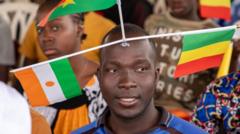The West African regional bloc, Ecowas, has made headlines as it formally approved the withdrawal of three member countries—Mali, Burkina Faso, and Niger—whose governments have been run by military juntas. Leaders of Ecowas acknowledged the departure while proposing a six-month period for the nations to reconsider their exit, scheduled for January 2024. This marks a significant milestone, as it will be the first instance of any country leaving Ecowas since the bloc's establishment in 1975, aimed at promoting political and economic integration across West Africa.
The decision by Mali, Burkina Faso, and Niger comes amid strained relations due to ongoing military rule and declining democratic frameworks in these nations. Ecowas had previously requested a return to civilian governance, but the juntas have steadfastly refused, leading to their planned withdrawal from the bloc, a cornerstone of regional cooperation. The exit will result in a loss of approximately 76 million individuals, over eight percent of Ecowas's total population, along with more than half of its geographical area.
In response, Mali, Burkina Faso, and Niger formed a new coalition, the Alliance of Sahelian States (ASS), which announced plans for visa-free travel and residency rights for Ecowas citizens in an attempt to maintain regional connectivity. Leaders from the trio expressed their intentions to foster amicable relations, despite the withdrawal, emphasizing historical ties among the nations.
Despite Ecowas's disappointment, as voiced by its commission head Omar Touray, the bloc recognizes the challenges of maintaining unity in the face of militant insurgencies and growing ties between military leaders and Russia. Following military coups in these countries over the past three years, relations have soured, as Ecowas has been perceived as alignment with Western powers, further complicating the situation in the Sahel region.
Negotiations overseen by Senegal's President Bassirou Diomaye Faye and Togo's Faure Gnassingbé will continue during the grace period, underscoring Ecowas's hope for potential reconciliation with the departing members. The outcome of such dialogues and the future of regional cooperation remain uncertain as these significant developments unfold in West Africa.




















